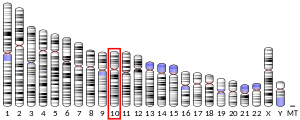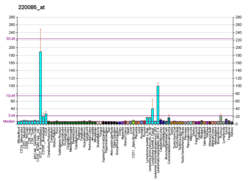HELLS
Lymphoid-specific helicase (Lsh) is a member of the SNF2 helicase family of chromatin remodeling proteins that in humans is encoded by the HELLS gene.
The HELLS gene has proved to play critical roles in DNA methylation, chromatin packaging, control of Hox genes, stem cell proliferation, and developing lymphoid tissue.
In a developing embryo, epigenetic programming is controlled through the mechanisms of DNA methylation and chromatin organization. These processes are the master regulators that determine which genes are turned on or off throughout development. Lsh, a protein encoded by the HELLS gene is a major regulator of methylation patterns and thus crucial to normal fetal development.
Mutations and knockouts of the HELLS gene severely disrupts the process of fetal programming. In mice, knockout of HELLS gene resulted in death of embryos at birth and caused embryonic growth retardation. In humans, hypomethylation caused by a mutation in the HELLS gene is linked to Immunodeficiency-centromeric instability-facial anomalies syndrome 4 (ICF4). This is a rare disease that causes immunodeficiency, facial anomalies, growth retardation, failure to thrive, and psychomotor retardation. The adverse effects due to the absence and mutation of the HELLS gene is a result of the extensive loss of genomic wide methylation and the abnormal expression of repeat sequences. The disruption in methylation patterns can cause the silencing of genes or the over-expression of genes, leading to abnormal and in some cases fatal developmental consequences.
This gene encodes a lymphoid-specific helicase. Other helicases function in processes involving DNA strand separation, including replication, repair, recombination, and transcription. This protein is thought to be involved with cellular proliferation and may play a role in leukemogenesis. Alternatively spliced transcript variants have been described, but their biological validity has not been determined.[5]
References
- GRCh38: Ensembl release 89: ENSG00000119969 - Ensembl, May 2017
- GRCm38: Ensembl release 89: ENSMUSG00000025001 - Ensembl, May 2017
- "Human PubMed Reference:". National Center for Biotechnology Information, U.S. National Library of Medicine.
- "Mouse PubMed Reference:". National Center for Biotechnology Information, U.S. National Library of Medicine.
- "Entrez Gene: HELLS helicase, lymphoid-specific".
Further reading
- Ohira M, Morohashi A, Nakamura Y, et al. (2003). "Neuroblastoma oligo-capping cDNA project: toward the understanding of the genesis and biology of neuroblastoma". Cancer Lett. 197 (1–2): 63–8. doi:10.1016/S0304-3835(03)00085-5. PMID 12880961.
- Andersson B, Wentland MA, Ricafrente JY, et al. (1996). "A "double adaptor" method for improved shotgun library construction". Anal. Biochem. 236 (1): 107–13. doi:10.1006/abio.1996.0138. PMID 8619474.
- Hillier LD, Lennon G, Becker M, et al. (1997). "Generation and analysis of 280,000 human expressed sequence tags". Genome Res. 6 (9): 807–28. doi:10.1101/gr.6.9.807. PMID 8889549.
- Yu W, Andersson B, Worley KC, et al. (1997). "Large-Scale Concatenation cDNA Sequencing". Genome Res. 7 (4): 353–8. doi:10.1101/gr.7.4.353. PMC 139146. PMID 9110174.
- Strausberg RL, Feingold EA, Grouse LH, et al. (2003). "Generation and initial analysis of more than 15,000 full-length human and mouse cDNA sequences". Proc. Natl. Acad. Sci. U.S.A. 99 (26): 16899–903. doi:10.1073/pnas.242603899. PMC 139241. PMID 12477932.
- Ota T, Suzuki Y, Nishikawa T, et al. (2004). "Complete sequencing and characterization of 21,243 full-length human cDNAs". Nat. Genet. 36 (1): 40–5. doi:10.1038/ng1285. PMID 14702039.
- Sun LQ, Lee DW, Zhang Q, et al. (2004). "Growth retardation and premature aging phenotypes in mice with disruption of the SNF2-like gene, PASG". Genes Dev. 18 (9): 1035–46. doi:10.1101/gad.1176104. PMC 406293. PMID 15105378.
- Deloukas P, Earthrowl ME, Grafham DV, et al. (2004). "The DNA sequence and comparative analysis of human chromosome 10". Nature. 429 (6990): 375–81. doi:10.1038/nature02462. PMID 15164054.
- Yano M, Ouchida M, Shigematsu H, et al. (2004). "Tumor-specific exon creation of the HELLS/SMARCA6 gene in non-small cell lung cancer". Int. J. Cancer. 112 (1): 8–13. doi:10.1002/ijc.20407. PMID 15305370.
- Gerhard DS, Wagner L, Feingold EA, et al. (2004). "The Status, Quality, and Expansion of the NIH Full-Length cDNA Project: The Mammalian Gene Collection (MGC)". Genome Res. 14 (10B): 2121–7. doi:10.1101/gr.2596504. PMC 528928. PMID 15489334.
- Xi, S.; Zhu, H.; Xu, H.; Schmidtmann, A.; Geiman, T. M.; Muegge, K. (28 August 2007). "Lsh controls Hox gene silencing during development". Proceedings of the National Academy of Sciences. 104 (36): 14366–14371. doi:10.1073/pnas.0703669104. PMID 17726103.
- Fan, T. (12 January 2005). "Lsh controls silencing of the imprinted Cdkn1c gene". Development. 132 (4): 635–644. doi:10.1242/dev.01612.
- Dennis, Kathleen; Fan, Tao; Geiman, Theresa; Yan, Qingsheng; Muegge, Kathrin (15 November 2001). "Lsh, a member of the SNF2 family, is required for genome-wide methylation". Genes & Development. 15 (22): 2940–2944. doi:10.1101/gad.929101. PMC 312825.
External links
- "HELLS (Helicase, Lymphoid-Specific)". Atlas of Genetics and Cytogenetics in Oncology and Haematology.




